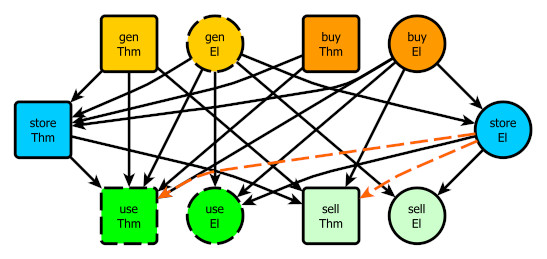
M. Sc. Jochen Illerhaus
- Research Associate
- Group:
- Room: 201/2
- Phone: +49 721 608-42471
- Fax: +49 721 608-42707
- jochen illerhaus ∂does-not-exist.kit edu
Karlsruher Institut für Technologie (KIT) Campus Süd
Institut für Regelungs- und Steuerungssysteme
Geb. 11.20 (Engler-Villa)
Kaiserstr. 12
D-76131 Karlsruhe
Curriculum Vitae
| 2012-2015 | German Abitur, majoring in mechatronics at Technisches Gymnasium Ravensburg in Ravensburg, Germany. Graduated with distinction. |
| 2015-2016 | General Studies at Lindenwood University in St. Charles, Missouri, USA. Left with excellent grades and distinctions but without graduation. |
| 2017-2024 | Tutor for Advanced Mathematics 1 to 3 for Bachelor students of Electrical Engineering and Physics at the Institute of Analysis at the Karlsruhe Institute of Technology. Most recently, execution of the first practical trials for hall tutorials. |
| 2019-2020 | Internship in the development of driver electronics for automotive lights at Xingyu Atomotive Lighting Systems in Changzhou, China. |
| 2019-2020 | Bachelor's thesis entitled “Market-based operation of 4th generation heating networks” at the Institute of Control Systems at the Karlsruhe Institute of Technology. |
| 2016-2021 | Bachelor of Science in Electrical Engineering and Information Technology at the Karlsruhe Institute of Technology. Electives from the field of super-conduction. |
| 2017-2021 | Successful completion of the courses on Theoretical Physics for Bachelor students of Physics. |
| 2020-2022 | Student assistant at the Institute for Control Systems at the Karlsruhe Institute of Technology, focusing on the simulation and optimal operation of district heating networks. |
| 2023-2024 | Master's thesis entitled “Passivity Based Reinforcement Learning” at the Institute of Control Systems at the Karlsruhe Institute of Technology. |
| 2021-2024 | Master of Science in Electrical Engineering and Information Technology, with study model Control Systems at the Karlsruhe Institute of Technology and a final grade of very good. |
| since 2024 | Research assistant at the Institute for Control Systems at the Karlsruhe Institute of Technology. |
Research
Control of Sector-Coupled Energy Systems with Special Consideration of Thermal Energy Storage
Photovoltaics are already a cost-efficient and low-carbon form of energy generation. Consequently, it is desirable to maximize the share of energy consumption covered by photovoltaics. However, the output of photovoltaic systems is subject to daily and seasonal fluctuations. The future energy landscape will therefore be characterized by phases of almost unlimited availability of electrical power and periods when electricity must be treated as a scarce commodity and used efficiently. Large-scale energy storage systems are essential for balancing these fluctuations.
Heating buildings requires significant amounts of energy. Currently, this demand is predominantly met through fossil fuels, which poses both technological and social challenges. New buildings achieve low energy consumption thanks to modern insulation materials. In contrast, energy-efficient refurbishment of older buildings is often prohibitively expensive. Therefore, there is an urgent need for climate-friendly heating solutions that do not require extensive structural interventions.
Water-based thermal storage tanks offer significant potential. They are characterized by low costs, a favorable climate balance, minimal losses, and high capacities. Their primary disadvantage is that stored thermal energy cannot be efficiently converted into other forms of energy. While small storage systems are widely used to compensate for short-term power fluctuations, large-scale seasonal storage systems remain rare. However, such seasonal storage systems could be implemented on the district level and connected to buildings through heating networks.
Efficient operation of such thermal storage systems requires intelligent controllers that optimize energy flow. These controllers determine when and where, what type of energy should be generated, used, transported, or stored. In addition to managing thermal and electrical energy, they may integrate other energy sources such as natural gas, hydrogen and oil. The varying volatilities of producers and consumers increase the complexity of this sector-coupled, time-variant distribution problem.

If you are interested in research collaborations, theses, research internships, or student work experiences (HiWi), please do not hesitate to contact me at any time. In addition to the thesis opportunities below, there are always other exciting research topics available.
| Title | Type |
|---|---|
| Simulativer Vergleich von Heizkennlinien- und optimierungsbasierter Betriebsführung in vermaschten Fernwärmenetzen mit mehreren Erzeugern | Bachelor/-Master Thesis |
Publications
Maurer, J.; Illerhaus, J.; Soneira, P. J.; Hohmann, S.
2022. Energies, 15 (18), Art.Nr.: 6605. doi:10.3390/en15186605

